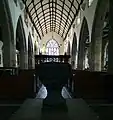Church of St Fimbarrus, Fowey
The Church of St Fimbarrus is an Anglican parish church in Fowey, Cornwall, England. Also known as Fowey Parish Church, it is in the Church of England's Diocese of Truro.[1] The church is a grade I listed building and dates from the 14th century.[2]

History
The church is dedicated to Saint Finbarr and is listed Grade I. It was built in the early 14th century and rededicated in 1336, replacing a previous Norman church. The church was damaged by the French in 1457, and repaired in 1460 by the Earl of Warwick, when the clerestory and the north and south aisles were rebuilt. There is a nave and two aisles with a clerestory, and the aisles are unusually wide; the aisles and the clerestory may be additions of the 15th century. The tower, of the 16th century, is of four stages and has buttresses and bands of ornament. There is an exceptionally fine 15th-century carved wagon roof. The south porch has open arches to the west and east and an eight-ribbed vaulted roof. The font is Norman, of Catacleuze stone, and similar to those of Ladock, Feock and St Mewan. The hexagonal pulpit was made in 1601. The monuments include two brasses of the mid 15th century and those of John Rashleigh, 1582, and Alice Rashleigh, 1602. The most interesting are two later Rashleigh monuments: John Rashleigh, c. 1610, and another of 1683.[3] The church was used as a town hall for a period up to 1684. Sir Arthur Quiller-Couch is buried in the churchyard.
Present day
Fowey Parish Church is a evangelical Anglican church. It had passed a resolution to reject the leadership of women in church.[4][5] In 2019, its vicar and half the congregation left to form an explicitly conservative evangelical church in the town outside of the Church of England but under the auspices of GAFCON.[6]
In May 2023, the chair of the Parochial Church Council (PCC) stepped down, along with two other members;[7] they had supported the resolution against a female vicar.[8] In July 2023, with a new PCC elected, the council voted unanimously to rescind the resolution and to open the job opening to both men and women.[9] It had been one of 150 parishes in the Church of England that rejected the leadership of women in church (including as vicars or bishops).[10]
Gallery
 Church tower
Church tower Nave
Nave Monument
Monument
References
- "Fowey Church (St. Fimbarrus): About Us". A Church Near You. The Archbishops’ Council. Retrieved 7 July 2023.
- Historic England. "CHURCH OF ST FIMBARRUS OR ST NICHOLAS (Grade I) (1327314)". National Heritage List for England. Retrieved 7 July 2023.
- Pevsner, N. (1970) Cornwall; 2nd ed. rev. Enid Radcliffe. Penguin; p. 70
- "Fowey Priest-in-Charge (Interim Part-Time)". Pathways. The Church of England. March 2023. Retrieved 7 July 2023.
Fowey church PCC recognises the different views within the PCC, but in a spirit of unity, support the position that Fowey Church should have an overall male leader
- Denton, Maxine (21 March 2023). "Church won't explain why woman priest refusal isn't sexist". CornwallLive. Retrieved 7 July 2023.
- Trewhela, Lee (25 September 2019). "Vicar denies new church in Cornwall is 'homophobic' and 'extreme'". CornwallLive. Retrieved 7 July 2023.
- "Fowey church council chair steps down after sexism row". BBC News. 24 May 2023. Retrieved 29 July 2023.
- "Church leader says controversial male vicar choice was not sexist". Falmouth Packet. 4 June 2023. Retrieved 29 July 2023.
- "Fowey St Fimbarrus Church reverses decision not to hire female vicars". BBC News. 29 July 2023. Retrieved 29 July 2023.
- Burgess, Kaya (28 July 2023). "Church of England campaigners demand end to bans on women priests". The Times. Retrieved 29 July 2023.
The parish was one of 590 in the Church of England — 4.8 per cent of the total — to formally declare that they would not accept a woman as lead cleric or accept the oversight of a female bishop. The system was put in place in 2014 after women won the right to become bishops. It was designed to support about 150 evangelical or "complementarian" parishes that do not back women as lead priests or as bishops, believing that the Bible teaches that only men should be in "headship" roles within the family and church.